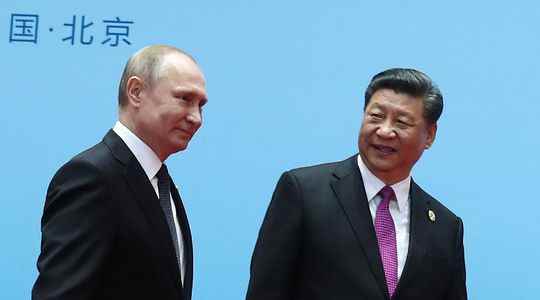Let it be said: Xi Jinping, who has not left his country since January 2020, more than two and a half years ago, is no longer afraid to travel. And he is not afraid either to appear alongside Vladimir Putin, isolated by the West for having attacked Ukraine, and whose country is targeted by Western sanctions. “The Red Emperor” will indeed meet this Thursday in Uzbekistan the head of the Kremlin, on the sidelines of a summit of the Shanghai Cooperation Organization (SCO), a body bringing together four Central Asian states, China, the Russia, India, Iran and Pakistan.
This move is symbolic in more ways than one. First of all, Beijing strongly confirms its support for Moscow – even if the meeting with Putin does not take place in Moscow. “It is undeniable on the diplomatic, economic and energy levels (China has increased its imports of hydrocarbons), insists Alice Ekman, researcher in charge of Asia at the Institute for Security Studies of the European Union (EUISS ). It’s not just a show of support, or a marriage of interest in the face of Western sanctions.”
China is ready to “pay the price” for its rapprochement with Moscow
Since the beginning of the war in Ukraine, the Chinese authorities have relayed Russian propaganda. And the recent reconquest of Ukraine has changed nothing. Li Zhanshu, the regime’s number three, did not hesitate to justify the war waged by Russia, of which he made a victim. “The United States and NATO have threatened Russia on its doorstep, driving it into a corner. It is only natural that Russia will retaliate to protect its core national interests. China fully understands Russia and has helped in various ways,” he said recently at an economic forum in Russia. The Russian army also conducted spectacular military exercises on its territory in September, in which Chinese soldiers participated.
For Xi Jinping, the “limitless” partnership with Moscow announced during the Beijing Olympics last February, shortly before the outbreak of the conflict, remains relevant to deal with what these two authoritarian powers consider to be their common enemy: the United States and its allies. “China is ready to pay the price in terms of economy and image, so strong is its political and geostrategic rivalry with the world’s leading power”, comments Alice Ekman. And this, especially since it also benefits from the weakening of the Russian Bear, from which it buys its energy materials cheaper and sells more products because of the war.
However, the Chinese number one will probably take care not to rob the Central Asian countries of the SCO, a region in which Beijing has been investing heavily for years to increase its influence. Nor to cross the red lines linked to the war in Ukraine. “China will continue to de facto comply with Western sanctions to avoid putting a target behind its back, and it will deploy a hypocritical rhetoric of ‘peace’ and ‘stability’ to appease Central Asian nations and Southern partners who are worried about Moscow’s war in Ukraine” and are “terrified by Russia”, predicts Evan Fegenbaum, vice president in charge of studies at the Carnegie Endowment for International Peace, an American think tank.
The fact that Xi first visits Kazakhstan – where he announced his gigantic New Silk Roads project nine years ago – then, for the summit, the city of Samarkand in Uzbekistan (a mythical stage of the ancient caravan route), is not insignificant either. The Chinese president could take the opportunity to try to give a boost to this initiative, slowed down by the Covid epidemic.
This move is also of domestic importance. It comes a month before the 20th Congress of the Communist Party of China (CCP), which will begin on October 16 and should grant a historic third term to Xi Jinping. “By going to Kazakhstan and to this SCO summit before this major political meeting, he shows that he is fully in control, that he can afford to leave the country, that nothing calls into question his authority, believes Alexander Gabuev, researcher at the Carnegie Center in Moscow. But it is also a signal that life is normalizing, that the battle against Covid will soon be over. Even if the country remains barricaded for the moment.
